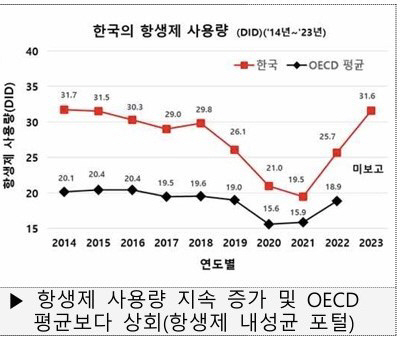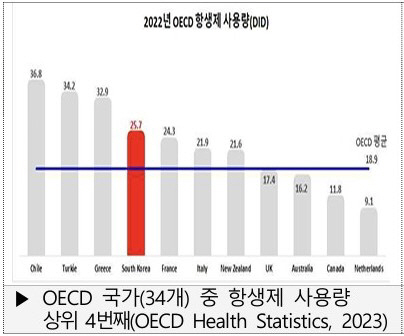Antibiotic Inadequate Prescription Rate 30%…Concerns over the occurrence of resistance due to misuse or abuse ↑
|
|
The ASP pilot project, which began in November last year, is a compensation system for medical institutions to induce appropriate prescriptions of antibiotics, and supports health insurance finances if dedicated personnel carry out a series of activities to prevent misuse and abuse of antibiotics, such as monitoring and managing the appropriateness of prescribed antibiotics, establishing appropriate prescription standards, and establishing a cooperative system within the institution. It will run until the end of 2027.
Antibiotic resistance refers to a phenomenon in which bacteria do not work by creating a way to resist a specific antibiotic. Antibiotic resistance reduces the range of effective treatment options and poses a serious threat to the course of treatment in immunocompromised or severely infected patients. As of 2019, the number of deaths from antibiotic resistance reached 1.27 million, and it is expected to exceed 10 million by 2050.
In 2016, the World Health Organization (WHO) recommended active responses at the national level to solve antibiotic resistance problems, and in 2019, 'antibiotic resistance' was designated as one of the top 10 risk factors for human life. In recent years, the United Nations has strongly urged national cooperation to resolve resistance issues through the Political Declaration (2024).
The use of antibiotics in Korea, which has been on the rise since 2021, is higher than the average OCED, and in particular, the use continues to increase due to factors such as aging and infectious disease epidemic. As of 2022, it ranks in the top four OECD countries and is about 1.36 times higher than the average (18.9DID). As of 2019, the antibiotic inappropriate prescription rate is about 30%, and it is pointed out that proper use management is required, and there is a lack of professional and dedicated personnel for proper use management of antibiotics (ASP) in medical institutions. In 2018, only 5.2% of institutions have collimated ASP personnel.
Accordingly, the Korea Centers for Disease Control and Prevention has been implementing a 'antibiotic proper use management pilot project' since November last year to establish the basis for proper antibiotic use management and activation of medical institutions.
This on-site inspection will be carried out for the stable operation and early settlement of the project, and 15 places (about 20%) will be selected and inspected first among participating organizations (78 places) in the first year in consideration of regions, bed size, and operational characteristics. (We will add and expand the inspection targets every year thereafter). The Korea Centers for Disease Control and Prevention will form a joint inspection team with experienced experts in ASP to provide advice on practical knowledge and strategies or methods necessary for ASP activities to participating organizations.
In particular, at Bundang Seoul National University Hospital, which is the first inspection target, the head of the Korea Centers for Disease Control and Prevention, an infectious disease expert, will ask for active support for ASP activities through a meeting with the hospital director and encourage the efforts of ASP team members in medical institutions.
Director of the Korea Centers for Disease Control and Prevention Lim Seung-kwan said "The proper use of antibiotics is to protect public health, especially the health and life of the elderly and children who are sensitive to infection. We are grateful that medical institutions are interested in and actively participate in ASP projects even in difficult situations both internally and externally"The Korea Centers for Disease Control and Prevention will continue to make efforts to ensure that ASP can settle into a medical culture and spread to small and medium-sized nursing hospitals and clinics in the future."
This article was translated by Naver AI translator.





